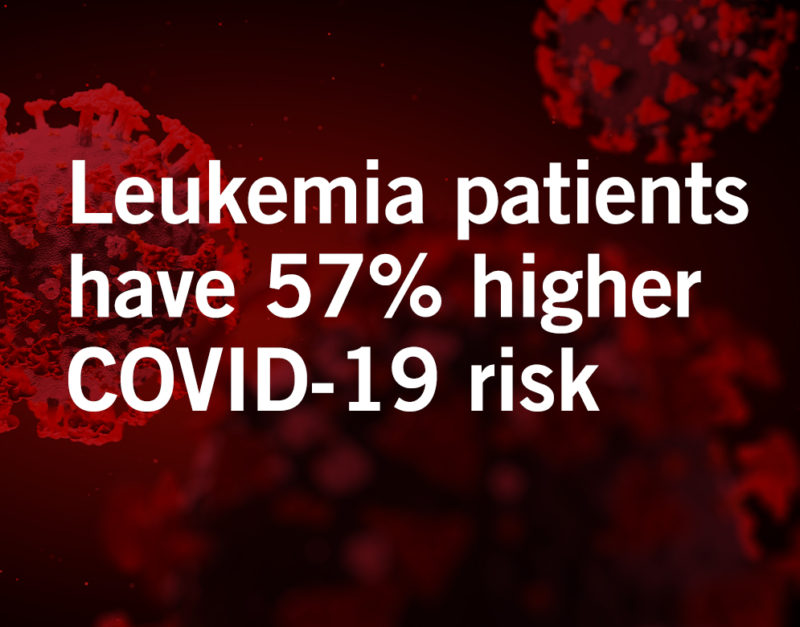 May 6, 2021
May 6, 2021 Though over a year has passed since COVID-19 first emerged in Wuhan, China, the novel coronavirus continues to take doctors, scientists, and global health professionals by surprise. Every day, new and accelerated research is published and peer-reviewed with the intention to develop new norms and standards that can contain the spread of the pandemic. To date, there has been no detected natural immunity from this virus – it is a threat to every individual, particularly those with pre-existing medical conditions like blood cancers.
The pandemic has flooded hospitals with patients worldwide, interrupting time-sensitive care for cancer and other challenging conditions. For this very reason, compiling data that will help physicians understand which populations are most vulnerable to the disease is critical to ensuring that every person is protected.
Blood Cancer Patients Face High Risk of Severe COVID-19 Symptoms
Like many different cancers, blood cancers are developed among individuals with certain genetic inheritances or abnormalities. But leukemia can also be influenced by occupational and environmental exposure to benzene for lengthy periods of time. With an estimated 60,530 newly diagnosed cases of leukemia in 2020 alone, it is crucial that cancer patients are observed in how they respond to a novel virus like COVID-19.
A new study published in The Lancet Oncology journal has closely monitored cancer patients – specifically those with blood cancer – to understand why they are at a higher risk of developing extreme COVID-19 symptoms. According to the authors, people with leukemia and other blood cancers who contract coronavirus face as much as a 57% higher chance of having severe and life-threatening symptoms compared to those with breast cancer. Additionally, a leukemia-diagnosed patient also stands out among other blood cancer patients because the likelihood of death from COVID-19 is more than double. Researchers suspect this is because leukemia patients have an increased susceptibility to viral infection.
Though researchers have known for months that cancer patients are significantly more vulnerable to developing dangerous symptoms than healthy individuals, it is the comparison between one cancer group to another that has fascinated scientists. Researchers initially assumed that the virus attacks all immunocompromised groups the same way. Now they understand that patients with different types of tumors are prone to different COVID-19 symptoms.
Age is an Important Factor
According to the same study, demographics like age and sex also influence the case-fatality rate of patients. Research shows that the COVID-19 fatality rate increased almost fivefold from patients ages 40 to 49 compared to those who were 80 or older. After researchers controlled those two factors (age and sex), they found that blood cancer patients treated with chemotherapy were twice as likely to die after COVID-19 associated hospitalization.
Fighting Off Cancer and COVID-19
The year has seen a massive change in global protocol, particularly when it comes to the way we react to treatments, patients, hospitals, and public health as a whole. The careful consideration of how to deal with those who are ill with cancer during a pandemic is a testament to the sheer commitment and hard work of health professionals like doctors and nurses.
It is important for people to remember that everyone can help by keeping a six-foot distance from one another. While humans are social creatures by nature, it is times like these when alternative measures are worth exploring for public health safety. Practicing hygiene by regularly washing hands and wearing masks are some of the few habits that slow down the spread of COVID-19.
The American Cancer Society suggests several steps to protect everyone from the coronavirus. Here are some quick tips for staying healthy and reducing your risk.
- Practice social distancing and stay at home.
- If going out in public, wear a mask that covers the nose and mouth.
- Wash hands frequently with soap and water and avoid shaking hands.
- Discuss the possibility of telemedicine or video meetings with doctors.
- If infusions usually occur at a medical facility, ask about alternatives or home treatments.
- As always, leukemia patients should first talk to their physician for the best action plan and additional tips.
How We Help Benzene Victims
Seek justice with the help of our experienced attorneys. Our Dallas, Texas benzene law firm has battled corporate giants on behalf of individuals like you for 20 years, aggressively fighting to hold them responsible for dangerous chemicals and the personal injuries and cancers they cause. If you have been diagnosed with leukemia caused by dangerous products, we can help.


